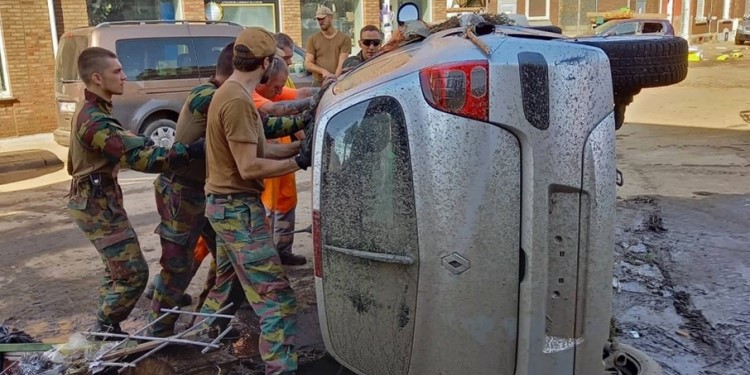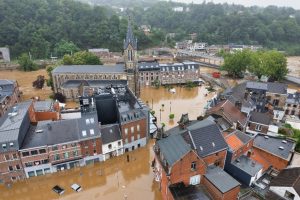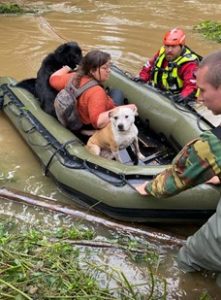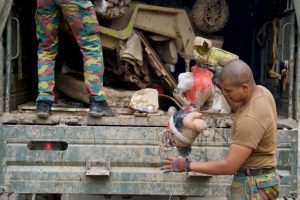Climate Emergency: Deployment of Belgian Military During Flooding
During the night of 14 July, the water level of the River Meuse in the southern part of Belgium and its tributaries rose rapidly. Many inhabitants spoke of a tsunami. Residents of a dozen or so municipalities were taken by surprise and fled in a hurry. Others were stuck in their homes and had to make a hole in the roof. There they sat, sometimes for twelve hours or more, waiting for rescue. The water poured into the streets of the Ardennes villages up to four metres high, dragging everything in its destructive power. In other parts of Belgium, too, the heavy rainfall caused a lot of inconvenience, but the devastation was less severe. In total, 37 people were killed and several hundred injured. More than 15,000 people were made homeless and at least 500 houses are permanently destroyed.
The deployment of military capacities
The Belgian armed forces were deployed within 24 hours for the first emergency aid: search, rescue and evacuation of victims. It is mainly engineers (boats, bulldozers, pumps, cranes, power supply), manpower (infantrymen) and emergency medical assistance that are sent to the affected region. When, a few days after the disaster andthe clean-up work started, the government again called on the Defence Forces. This time, in addition to engineering resources, it mainly called on transport resources and towing vehicles from the logistics department and medium-heavy transport helicopters.
Since the beginning of August, the emergency aid phase has passed into the follow-up and reconstruction phase. Within the framework of the follow-up aid, the Belgian military has been entrusted with the coordination of food distribution. Field kitchens are deployed for that purpose. In addition, Defence is helping to provide shelter for the victims (containers, tents and barracks) and sanitary (showers) and medical support, whilst engineering and logistical resources are still being deployed for emergency repairs and transport. On average, around 200 soldiers are deployed daily to the affected areas.
Reaction of the population
It should come as no surprise that the affected population greatly appreciates the deployment of the Belgian military. The difference in attitude between this type of deployment and missions abroad is really quite striking. Where in Belgium there is mainly apathy towards foreign missions, the interest, appreciation and support for the deployment at home is very high. To a large extent, this is easy to explain. Internal security touches directly on daily life. Belgians lie awake worrying about security in their streets and neighbourhoods and consider the protection of critical energy, transport and communication infrastructure absolutely crucial. In addition, patrols in the streets and fixed surveillance posts in our cities in the context of the fight against terror are also much more visible and tangible than covert operations in faraway countries.
Citizens’ expectations
It is true that the presence of the military in the cities gives many people an uncomfortable feeling. But despite the aversion to military action in some environments, this kind of crisis does show that the vast majority of Belgians believe that the military has an essential role to play in their own country, both in the framework of assistance to the nation in case of disasters and in ensuring the safety and security of Belgian society. After all, the citizen expects the security to which he or she is entitled and for which he or she pays taxes towards. Who provides it is ultimately irrelevant. That is why citizens also expect the military to be there within the Belgian borders when safety or security is at stake – not only abroad and not only in cases of natural disasters or other calamities on Belgian soil.
The time when a border could be drawn around countries and, on that basis, security could be divided between the police – (internal security)- and the armed forces(external security) is definitely over. In fact, for both the police and the military, the distinction between the inside and the outside of the national territory no longer offers much in the way of guidance for delineating tasks. That is why it is crucial to think about new foundations for organizing security, not to mention because more and more parties, including from the private sector, are involved in security tasks.
Different role and new tasks for the armed forces
In addition, the context also forces us to redefine the position and function of everyone involved in homeland security as it will be all hands on deck for all security players in the coming years. Attacks with ‘weapons of opportunity’ such as cars and trucks, as well as actions by radicalized ‘lone wolves’ or ‘homegrown’ terrorists, will remain part of the threat spectrum on national territory. The digital threat to public and private networks and nodes will only increase. The likelihood that rogue groups in our country will use drones, portable air defence missiles or ground-to-air missiles is increasing. Rising inequality is going to overburden our cities’ capacity to care. Together with growing tensions between population groups, this may become a major factor of instability and insecurity in our own country. Social media has revolutionized so many societal domains, from dating to business to politics. But it will also revolutionize warfare, with borders between home and abroad completely disappearing. As a result, politicians and other decision makers will have to be even more mindful of violence spread through social networks and a new form of conflict based on the next iteration of the internet.
In light of these developments, it is highly questionable what the ‘shelf life’ is of an approach in which the armed forces are considered only as a last safety net for internal security. Is it still opportune to allocate domestic security solely to the police and emergency services and only to deploy military means when the former are short of capacities?
The citizens have already answered this question. The majority of Belgians want to give the military a substantial role in securing Belgian society. Thus, they already ignore the artificial split between core military tasks abroad and residual tasks at home. It is now up to our ministers and the Defence department itself to make this change so that the military becomes a structural and fully-fledged security partner at home – in the interest of everyone.
For more information please contact ACMP-CGPM.




